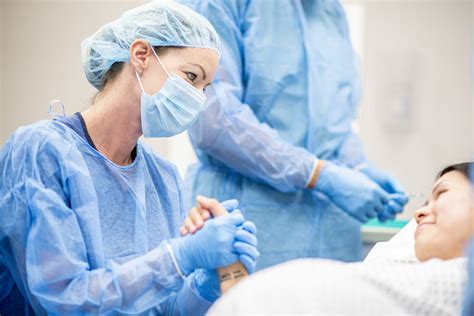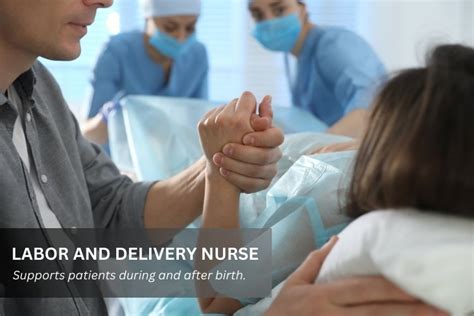Intro
Discover the rewarding role of a Labor and Delivery Nurse, providing emotional support and medical care to expecting mothers. Learn about the jobs responsibilities, required skills, and education. Explore the challenges and benefits of this specialized nursing career, and find out how to become a Labor and Delivery Nurse.
As the due date approaches, expectant mothers and their families eagerly anticipate the arrival of their newborn. However, the journey to motherhood can be a complex and overwhelming experience, especially during labor and delivery. This is where labor and delivery nurses come in – highly skilled and compassionate professionals who provide critical care and support to women and their families during this life-changing event.
Labor and delivery nurses play a vital role in the healthcare system, working closely with obstetricians, midwives, and other medical professionals to ensure a safe and successful delivery. These nurses are responsible for monitoring the mother's and baby's health, providing emotional support, and making quick decisions in high-pressure situations. With their expertise and care, labor and delivery nurses help bring new life into the world, making every birth a special and unforgettable experience.

What is a Labor and Delivery Nurse?
A labor and delivery nurse, also known as a labor and delivery registered nurse (LDRN) or obstetric nurse, is a registered nurse who specializes in the care of women and their families during pregnancy, labor, and delivery. These nurses work in hospitals, birthing centers, or clinics, providing hands-on care and support to patients throughout the childbirth process.
Labor and delivery nurses are highly trained professionals who possess a deep understanding of human anatomy, physiology, and psychology. They are skilled in fetal monitoring, medication administration, and surgical assistance, making them an essential part of the labor and delivery team.
Key Responsibilities of a Labor and Delivery Nurse
The role of a labor and delivery nurse is multifaceted and demanding. Some of the key responsibilities of these nurses include:
- Assessing patients' physical and emotional needs during labor and delivery
- Developing and implementing individualized care plans
- Monitoring fetal heart rates and maternal vital signs
- Administering medications and performing medical procedures as needed
- Providing emotional support and education to patients and their families
- Collaborating with obstetricians, midwives, and other healthcare professionals to ensure a safe and successful delivery
- Assisting with surgical deliveries, such as cesarean sections
Benefits of Being a Labor and Delivery Nurse
A career as a labor and delivery nurse can be incredibly rewarding, offering numerous benefits and opportunities for professional growth. Some of the advantages of this career path include:
- Making a difference in the lives of women and their families during a life-changing event
- Working in a fast-paced and dynamic environment that requires critical thinking and quick decision-making
- Opportunities for specialization and advancement in fields such as midwifery, nurse-midwifery, or nurse practitioner
- Competitive salaries and benefits
- Flexibility in scheduling and work arrangements

Challenges of Being a Labor and Delivery Nurse
While being a labor and delivery nurse can be a highly rewarding career, it also comes with its own set of challenges. Some of the difficulties that these nurses may face include:
- Managing high levels of stress and anxiety in a fast-paced environment
- Dealing with complex medical situations and making quick decisions in high-pressure situations
- Providing emotional support to patients and their families during a traumatic or stressful experience
- Maintaining a work-life balance and avoiding burnout
- Staying up-to-date with the latest medical research and technologies
Education and Training Requirements
To become a labor and delivery nurse, one must complete a rigorous education and training program. The typical requirements for this career path include:
- Earning an Associate's or Bachelor's degree in nursing
- Passing the National Council Licensure Examination (NCLEX-RN) to become a registered nurse
- Gaining experience in labor and delivery nursing through internships, residencies, or fellowships
- Obtaining certification in labor and delivery nursing, such as the RNC-OB or C-EFM credentials

Certifications and Specializations
Labor and delivery nurses can pursue various certifications and specializations to advance their careers and demonstrate their expertise. Some of the certifications that these nurses can obtain include:
- RNC-OB (Registered Nurse Certified in Obstetrics)
- C-EFM (Certified in Electronic Fetal Monitoring)
- RNC-MNN (Registered Nurse Certified in Maternal Newborn Nursing)
- CNM (Certified Nurse-Midwife)
Job Outlook and Salary
The job outlook for labor and delivery nurses is highly favorable, with the Bureau of Labor Statistics predicting a 12% growth in employment opportunities for registered nurses through 2028. The median salary for labor and delivery nurses varies depending on location, experience, and employer, but can range from $60,000 to over $100,000 per year.

Conclusion
A career as a labor and delivery nurse can be incredibly rewarding, offering numerous benefits and opportunities for professional growth. While this career path comes with its own set of challenges, the rewards of helping bring new life into the world make it a truly special and unforgettable experience.
If you're considering a career in labor and delivery nursing, we encourage you to explore this field further and learn more about the education and training requirements, certifications, and specializations that can help you succeed.
What is the average salary for a labor and delivery nurse?
+The median salary for labor and delivery nurses varies depending on location, experience, and employer, but can range from $60,000 to over $100,000 per year.
What are the education and training requirements for labor and delivery nurses?
+To become a labor and delivery nurse, one must complete a rigorous education and training program, including earning an Associate's or Bachelor's degree in nursing and gaining experience in labor and delivery nursing through internships, residencies, or fellowships.
What certifications can labor and delivery nurses obtain?
+Labor and delivery nurses can pursue various certifications, such as the RNC-OB, C-EFM, RNC-MNN, and CNM credentials, to demonstrate their expertise and advance their careers.
